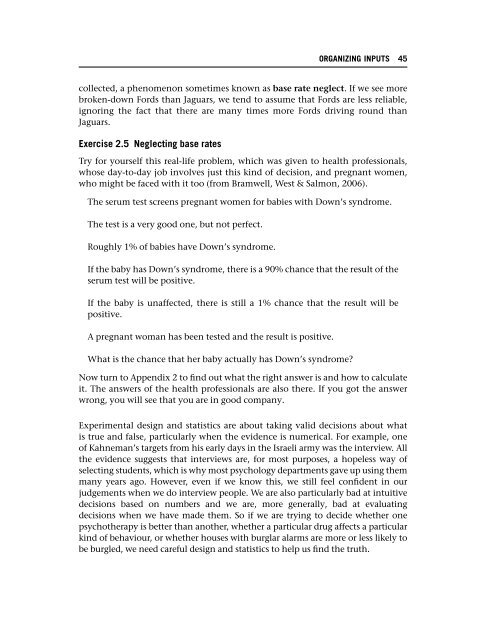Psychology - Forgot your username
Psychology - Forgot your username
Psychology - Forgot your username
You also want an ePaper? Increase the reach of your titles
YUMPU automatically turns print PDFs into web optimized ePapers that Google loves.
collected, a phenomenon sometimes known as base rate neglect. If we see more<br />
broken-down Fords than Jaguars, we tend to assume that Fords are less reliable,<br />
ignoring the fact that there are many times more Fords driving round than<br />
Jaguars.<br />
Exercise 2.5 Neglecting base rates<br />
Try for <strong>your</strong>self this real-life problem, which was given to health professionals,<br />
whose day-to-day job involves just this kind of decision, and pregnant women,<br />
who might be faced with it too (from Bramwell, West & Salmon, 2006).<br />
The serum test screens pregnant women for babies with Down’s syndrome.<br />
The test is a very good one, but not perfect.<br />
Roughly 1% of babies have Down’s syndrome.<br />
If the baby has Down’s syndrome, there is a 90% chance that the result of the<br />
serum test will be positive.<br />
If the baby is unaffected, there is still a 1% chance that the result will be<br />
positive.<br />
A pregnant woman has been tested and the result is positive.<br />
What is the chance that her baby actually has Down’s syndrome?<br />
ORGANIZING INPUTS 45<br />
Now turn to Appendix 2 to find out what the right answer is and how to calculate<br />
it. The answers of the health professionals are also there. If you got the answer<br />
wrong, you will see that you are in good company.<br />
Experimental design and statistics are about taking valid decisions about what<br />
is true and false, particularly when the evidence is numerical. For example, one<br />
of Kahneman’s targets from his early days in the Israeli army was the interview. All<br />
the evidence suggests that interviews are, for most purposes, a hopeless way of<br />
selecting students, which is why most psychology departments gave up using them<br />
many years ago. However, even if we know this, we still feel confident in our<br />
judgements when we do interview people. We are also particularly bad at intuitive<br />
decisions based on numbers and we are, more generally, bad at evaluating<br />
decisions when we have made them. So if we are trying to decide whether one<br />
psychotherapy is better than another, whether a particular drug affects a particular<br />
kind of behaviour, or whether houses with burglar alarms are more or less likely to<br />
be burgled, we need careful design and statistics to help us find the truth.






